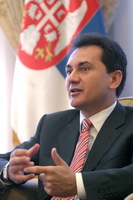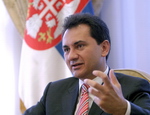Q:
A:
Serbia’s strategic goal to build a most competitive economy in Europe
Belgrade,
6 August 2007
Serbian Deputy Prime Minister Bozidar Djelic stressed that Serbia’s strategic goal is to take advantage of the EU integration process and turn its economy into one of the most competitive economies in Europe.
In an interview for the FoNet news agency, Djelic pointed out that in the past six years the Serbian economy has achieved growth of 6%, and the goal is to make this figure 7% in the upcoming years.
Serbia has had $1 billion of investments on average and our goal is to raise the number to 2 or 3 billion every year, as well as to attract one or two major greenfield investments each year, said Djelic and announced he will propose a change of macroeconomic, fiscal and monetary policy this autumn.
According to Djelic, public expenditure must be reduced and the monetary policy changed since it led in the past to huge losses for the National Bank of Serbia of around €450 million, which the bank cannot cover any longer.
He added that the inherited situation includes the foreign trade deficit which is 40% higher in the first five months of 2007.
Dinar’s exchange rate is severely influenced by huge public spending, as well as by the foreign trade deficit, which may lead to a downfall in foreign currency reserves unless the deficit is covered up.
He also said there are no reasons for changing dinar’s exchange rate, however, another manner must be found to make the monetary and fiscal policies harmonised to keep the inflation rate low and to achieve planned economic growth of 7%.
The projections for this year are that the inflation rate should stand at 6.5% and economic growth at 7%. We should make such a system of public finances which will spend little and yet have enough room for investing in the future, said the Deputy Prime Minister.
Djelic, who is also head of the Serbian negotiating team with the EU, said that Serbia will become a full EU member by 2014.
He stressed that in the political and economic sense, this year will mark a beginning of a new electoral and budgetary cycle in the EU itself, in which Serbia might also take part.
He voiced belief that Serbia will initial the Stabilisation and Association Agreement (SAA) with the EU in October and, if full cooperation with the Hague Tribunal is achieved, the SAA may also be officially signed by year’s end.
For our part, the cooperation with the Hague implies that we do all we can to locate and extradite the remaining four indictees, explained the Deputy Prime Minister and added that Serbia is doing its best to conclude this cooperation.
Speaking about Serbia’s European plan, Djelic said that the government’s goal is to apply for EU candidacy in the first half of 2008, during Slovenia’s presidency, whereas the candidate status may be granted in the second half of 2008, when France takes over the chair.
As for the EU integration process in Kosovo-Metohija, Djelic said that the member states and the European Commission clearly stated that Serbia’s EU accession process is unrelated to the resolution of the province’s status.
It is clear that Serbia would never accept any such conditions, and any attempt to link these two issues will undermine democracy in Serbia since the situation will become more serious, extremism will be on the rise again which is, as everyone in Europe who is well-informed knows, an alternative that is not a good thing to be proposed to Serbia, said Djelic.
According to Djelic, Serbia will refuse that and if others insist on the matter, it will have negative consequences on everyone in Serbia, the region and Europe.
He added that on the basis of UN Security Council Resolution 1244, a compromise solution for Kosovo-Metohija should have already been reached, and that through a new Security Council resolution.
Djelic said that all leaders in the region he talked with said that in their opinion, an optimum solution would be compromise between Belgrade and Pristina, which is what they are hoping for.
Speaking about the role of Serbian parliament in the EU integration process, Djelic recalled that in the first several months, parliament adopted around 50 new laws and decisions, though the dynamics must be increased in the upcoming period.
The government also adopted an Action Plan envisaging the adoption of 44 laws in 13 areas, recalled Djelic and voiced conviction that Serbian citizens clearly realise that EU membership is an opportunity for a better life.
Though 100 days of this government have not yet expired, Djelic said that the government is absolutely unanimous regarding the resolution process of Kosovo-Metohija’s future status, cooperation with the Hague Tribunal and fighting organised crime and corruption.
Serbia has had $1 billion of investments on average and our goal is to raise the number to 2 or 3 billion every year, as well as to attract one or two major greenfield investments each year, said Djelic and announced he will propose a change of macroeconomic, fiscal and monetary policy this autumn.
According to Djelic, public expenditure must be reduced and the monetary policy changed since it led in the past to huge losses for the National Bank of Serbia of around €450 million, which the bank cannot cover any longer.
He added that the inherited situation includes the foreign trade deficit which is 40% higher in the first five months of 2007.
Dinar’s exchange rate is severely influenced by huge public spending, as well as by the foreign trade deficit, which may lead to a downfall in foreign currency reserves unless the deficit is covered up.
He also said there are no reasons for changing dinar’s exchange rate, however, another manner must be found to make the monetary and fiscal policies harmonised to keep the inflation rate low and to achieve planned economic growth of 7%.
The projections for this year are that the inflation rate should stand at 6.5% and economic growth at 7%. We should make such a system of public finances which will spend little and yet have enough room for investing in the future, said the Deputy Prime Minister.
Djelic, who is also head of the Serbian negotiating team with the EU, said that Serbia will become a full EU member by 2014.
He stressed that in the political and economic sense, this year will mark a beginning of a new electoral and budgetary cycle in the EU itself, in which Serbia might also take part.
He voiced belief that Serbia will initial the Stabilisation and Association Agreement (SAA) with the EU in October and, if full cooperation with the Hague Tribunal is achieved, the SAA may also be officially signed by year’s end.
For our part, the cooperation with the Hague implies that we do all we can to locate and extradite the remaining four indictees, explained the Deputy Prime Minister and added that Serbia is doing its best to conclude this cooperation.
Speaking about Serbia’s European plan, Djelic said that the government’s goal is to apply for EU candidacy in the first half of 2008, during Slovenia’s presidency, whereas the candidate status may be granted in the second half of 2008, when France takes over the chair.
As for the EU integration process in Kosovo-Metohija, Djelic said that the member states and the European Commission clearly stated that Serbia’s EU accession process is unrelated to the resolution of the province’s status.
It is clear that Serbia would never accept any such conditions, and any attempt to link these two issues will undermine democracy in Serbia since the situation will become more serious, extremism will be on the rise again which is, as everyone in Europe who is well-informed knows, an alternative that is not a good thing to be proposed to Serbia, said Djelic.
According to Djelic, Serbia will refuse that and if others insist on the matter, it will have negative consequences on everyone in Serbia, the region and Europe.
He added that on the basis of UN Security Council Resolution 1244, a compromise solution for Kosovo-Metohija should have already been reached, and that through a new Security Council resolution.
Djelic said that all leaders in the region he talked with said that in their opinion, an optimum solution would be compromise between Belgrade and Pristina, which is what they are hoping for.
Speaking about the role of Serbian parliament in the EU integration process, Djelic recalled that in the first several months, parliament adopted around 50 new laws and decisions, though the dynamics must be increased in the upcoming period.
The government also adopted an Action Plan envisaging the adoption of 44 laws in 13 areas, recalled Djelic and voiced conviction that Serbian citizens clearly realise that EU membership is an opportunity for a better life.
Though 100 days of this government have not yet expired, Djelic said that the government is absolutely unanimous regarding the resolution process of Kosovo-Metohija’s future status, cooperation with the Hague Tribunal and fighting organised crime and corruption.











